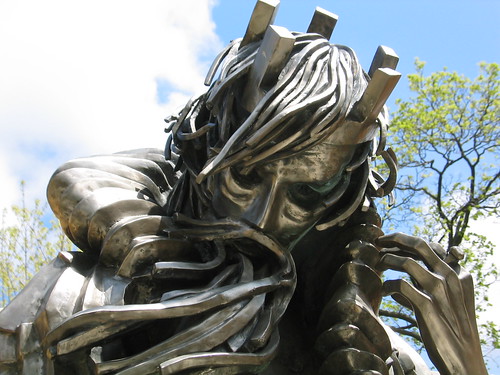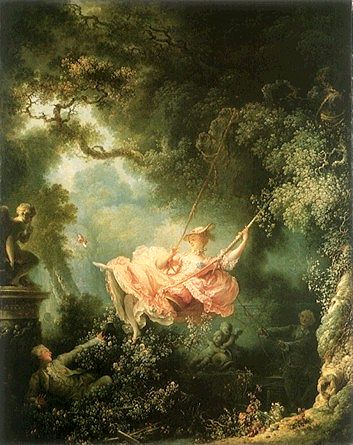Thursday, February 28, 2008
Indirect Characterization in Drama
Remember that indirect characterization is a tool writers use to imply something about a character without directly stating it. Writers may do this through the character's own actions, speech, and thoughts, as well as through what other characters think and say about the character. What a character looks like and how a character affects others can also contribute to indirect characterization.
The passages you pick should reveal aspects of a character (or characters) without directly stating what those aspects are. Therefore, a perceptive and thoughtful reader should be able to figure out what the author is suggesting without being directly told.
Monday, February 25, 2008
Bananas & the Importance of Historical Context!
Dictionary.com lists 1965-1970 as the period in which "bananas" took on the meaning "crazy, deranged".
As I Lay Dying was published in 1930.
Seems Faulkner wasn't making a joke about Dewey Dell and Vardaman eating bananas instead of going bananas...or if he was his audience wouldn't have gotten the joke.
This is a clear illustration of the importance of knowing what a word meant at the time a work was written. This will be an important consideration when we read King Lear.
*(In case you are wondering, the first recorded use of the word "nuts" to mean "crazy" appears in 1846, which seems to have been derived from the phrase "be nutts upon" meaning "be very fond of" (1785), a use which seems to have been derived from "nuts" meaning "any source of pleasure" (1617).)
Please respond in the comment box if the topic interests you.
Friday, February 15, 2008
Independent Study of Drama
As you read or after you read, discuss the relationship between any of the following points (your choice) and the play you are reading. Post at least twice on some of the following topics by Tuesday, February 26. Also post at least once in response to a peer's comment. (Three total.)
Themes
* In the plays characters struggle between following personal paths (pursuing a passion, seeking self-understanding, etc.) and serving (following, agreeing with, sacrificing for) their families and/or society. Or, to put it a different way, In the plays families and societies often represent limits against which characters push.
* In the plays characters struggle to understand themselves and their relationships with family and society. Characters often harbor misunderstandings about themselves, their families, and/or their society that are re-examined over the course of the novel often because of dramatic revelations (of secrets, hidden history, etc.) and/or enlightening experiences.
Literary Techniques
While reading look for passages in which the playwright employs indirect characterization. After vacation we'll analyze these passages.
Track at least one object that functions as a motif (perhaps a symbol, perhaps an objective correlative) in the work.
Historical Context
Think about how the time and place (historical context) affect the relationship between individuals' identities, their families, and the society.
Tuesday, February 12, 2008
Self, Family, and Society
You will read one of the following plays by February 26. You will post responses to the play on the blog.
Title (Author)
Oedipus Rex (Sophocles)*
The Oresteia: Agamemnon, Libation Bearers, and Eumenides (Aeschylus)
Medea (Euripides)**
The Duchess of Malfi (Webster)**
Enemy of the People (Ibsen)**
A Doll’s House (Ibsen) **
The Wild Duck (Ibsen) **
Hedda Gabler (Ibsen) *
Blood Wedding (Lorca)#
Yerma (Lorca)#
House of Bernarda Alba (Lorca)#
Juno and the Paycock (O’Casey)**
Translations (Friel) #
Top Girls (Churchill)
Glass Menagerie (Williams)*
Long Day’s Journey into Night (O’Neill)*
A Touch of the Poet (O’Neill)**
A Moon for the Misbegotten (O’Neill)**
Death of a Salesman (Miller)*
Fences (
The Piano Lesson (
* marks plays that are owned by
** marks plays that are available in the high school library
# marks plays that you could borrow from Mr. Cook
Monday, February 11, 2008
Sophocles' Antigone & Aristotle's Poetics
Read the following questions and passages about Aristotle's Poetics and Sophocles' Antigone. Post comments by with your name, the number of the question you are responding to, and then a response to the question. Due Wednesday.
HAMARTIA IN ANTIGONE
1. What role does "hamartia" play in Antigone? Pay attention to the "complex meaning" of hamartia when answering the question.
2. Where you would lay the blame for the tragedy? Explain. Think about individual blame and inevitable, cosmic fate.
The Greek word that describes what many people refer to as the "tragic flaw" of the hero of Greek tragedy, hamartia has a complex meaning which includes "sin," "error," "trespass," and "missing the mark" (as in archery–missing the bull's-eye). The "mistake" of the hero has an integral place in the plot of the tragedy. The logic of the hero's descent into misfortune is determined by the nature of his or her particular kind of hamartia.
3. Did you feel fear and pity followed by a catharsis when reading Antigone? If not, why not? When responding consider the special meaning of these words in Aristotle's Poetics. (The meanings are explained below.)
4. When have you ever felt fear and pity followed by catharsis when experiencing a work of art (a play, a film, a novel, a poem, a song, a painting, a sculpture, etc.)? Explain. I think, as modern readers, you will find Gadamer's explication (below) of what Aristotle meant by catharsis to be especially helpful and interesting.
FEAR AND PITY
Fear is one of the emotions aroused in the audience of a tragedy. This fear results, Aristotle seems to suggest, when the audience members understand that they, as human beings bound by universal laws, are subject to the same fate that befalls the tragic hero. Fear, along with pity, is "purged" in the process of catharsis. Along with fear, pity is one of the emotions aroused in the audience of a tragedy. We respond with pity, Aristotle seems to suggest, when we as members of the audience identify with the tragic hero's suffering. Pity and fear are "purged" in the process of catharsis.
CATHARSIS
One of the most difficult concepts introduced in the Poetics is catharsis, a word which has come into everyday language even though scholars are still debating its actual meaning in Aristotle's text. Catharsis is most often defined as the "purging" of the emotions of pity and fear that occurs when we watch a tragedy. What is actually involved in this purging is not clear. It is not as simple as getting an object lesson in how to behave; the tragic event does not "teach us a lesson" as do certain public-information campaigns on drunk driving or drug abuse. Hans-Georg Gadamer's attempt to describe catharsis in his study Truth and Method can serve both as a working definition and an introduction into the problem of establishing any determinate definition of this elusive concept:
What is experienced in such an excess of tragic suffering is something truly common. The spectator recognizes himself [or herself] and his [or her] finiteness in the face of the power of fate. What happens to the great ones of the earth has exemplary significance. . . .To see that "this is how it is" is a kind of self-knowledge for the spectator, who emerges with new insight from the illusions in which he [or she], like everyone else, lives. (132){SOURCE for everything above except for the questions: John Zuern's CriticaLink site hosted by the University of Hawai'i}
5. Respond to at least one comment posted by a peer.







